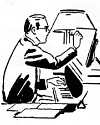|
|
|
1. The Intangible in Human Progress
A Radio Talk by Charles F. Kettering
We have just been listening to some
of the world's great music. The writing of this fine music has many
"intangibles." The notes and intervals and sequences are arranged so as
to produce a pleasing, a dramatic, or an inspiring impression. The
timing and the arrangements and all the other things that go into a
composition determine how much you, the public, will like it. These
great musical masterpieces are the final result of inspiration, of cut
and try - rewrite and try again. The dramatic stories from the lives of
great composers tell this process much better than I can.
 Now, composition is to musical notes and tones and intervals what
inventions are to iron, and steel, and copper. The difference between
good compositions and bad ones, between good inventions and bad ones,
is an intangible coordination which is very poorly understood.
Now, composition is to musical notes and tones and intervals what
inventions are to iron, and steel, and copper. The difference between
good compositions and bad ones, between good inventions and bad ones,
is an intangible coordination which is very poorly understood.
You people out there listening to me are
sitting in front of a radio. It may be a popular-priced one. It may be
a very expensive one. That is not important. But did you ever stop to
think just how much that radio of yours is really worth? I mean, if you
took it apart and put prices on the parts just as you would on your
dinner today. Say, so much for the spinach. So much for the cup of
coffee. So much for the lamb chop - that is, if you could get one.
|
|


 Now, composition is to musical notes and tones and intervals what
inventions are to iron, and steel, and copper. The difference between
good compositions and bad ones, between good inventions and bad ones,
is an intangible coordination which is very poorly understood.
Now, composition is to musical notes and tones and intervals what
inventions are to iron, and steel, and copper. The difference between
good compositions and bad ones, between good inventions and bad ones,
is an intangible coordination which is very poorly understood. 



